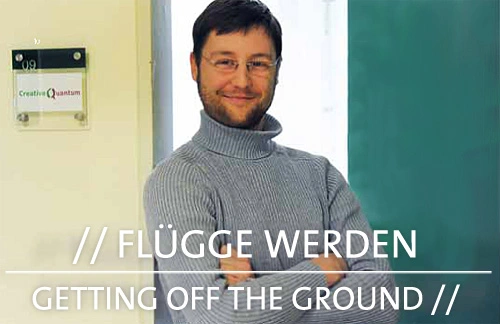Getting off the ground
Humboldt Innovation has a strong focus on Adlershof
Functional fixedness can be expressed as follows: “We’ve always done it that way, why should we do it any differently now?” Ranking beside the lack of funds or skills to launch, market, or push through an invention in the face of competition, functional fixedness is responsible for turning many good ideas into zero capital. No national economy and no university can afford to leave good ideas just lying around.
“Wanted!” is emblazoned across the campaign poster of Humboldt-Innovation (HI), the knowledge and technology transfer company of Humboldt-Universität zu Berlin (HU). What is wanted, explained Volker Hofmann, Head of the Business Start-ups division, are ideas that can make it, e.g. companies like Life Action Games that develops interactive games, or CreativeQuantum specializing in simulations for the chemicals and pharmaceuticals industries: two ideas among hundreds that are lying dormant in the buildings of Humboldt-Universität zu Berlin – and particularly at the Department of Computer Science. Without the assistance of Hofmann’s team, many of these ideas would take far longer or even fail to get off the ground.
Humboldt-Innovation is a contact and service center for planned and new startups from the HU. But Hofmann’s work begins even earlier: the courses at the university are to raise awareness for the subject and instil the spirit of entrepreneurialism. Seminars on developing ideas, links with the Berlin-Brandenburg Business Plan Competition, and the promoted dialogue between startup prospects and founders are only a number of modules that are to provide help. At the HU Department of Computer Science in Adlershof, Hofman found good listeners. Of all spinoffs he has supervised to date, 60% came from the IT and communications technology sectors.
“We have a strong focus on Adlershof,” he explained. Besides the spinoff ZONE, the university’s startup building on the Central/North Campus, the university is also running a spin-off ZONE on the Adlershof Campus. These startup buildings provide the space and the creative environment for developing and refining innovative ideas into successful business concepts. This is home to the team of the Berlin company Life Action Games headed by the young entrepreneurs Michael Schiemann and Tobias Bartosch. “They already had a very concrete idea,” explained Volker Hofmann, “an augmented reality live role game that enables iPads to combine motion picture elements, geocaching, and computer role games into a modern, digitised paper chase through the city.” Just next door, we find two young chemists Marek Checinski and Alexander Kulesza working for the company CreativeQuantum. The technology developed by these two can simulate chemical structures directly on a PC, saving time and substances. Chemical laboratory work can therefore be analysed for its potential success before investments are made.
In addition to infrastructure and advice, each project is also supported by a mentor, in most cases a professor at HU. This mentor then promotes the transfer of knowledge from the university to the still infant company. Here too, confided Hofmann, the computer scientists are especially active. In the meantime, the mentors also operate so to speak as scouts that communicate potential new startup ideas from research groups, students, or graduates to the Business Startups division.
“There are considerably fewer prospects shying away from startups,” summarised Miriam Rönn, Hofmann’s colleague and head of marketing. Berlin’s active startup scene, student startup initiatives, active professors, and go getter founders are setting things in motion in Berlin’s “startup industry”. “Only on very few occasions do we have to pull the emergency brake,” confessed Hofmann. Sometimes the idea doesn’t quite fit, sometimes graduates decide to opt for employment after all. Of about a hundred consultation cases a year, seven to ten become actual planned startups. Since 2005, 80 % of all supported startup ideas are still active and operating. What is important for success, explained Hofmann, are a committed and complementary team, a carefully planned business concept, an ability to network, and good advice.
By Rico Bigelmann for Adlershof Special
Links:
www.humboldt-innovation.de
www.life-action.eu
www.creative-quantum.eu
In Adlershof, HU and HI cooperate closely with WISTA-MANAGEMENT GmbH, the Adlershof innovation and startup center IGZ, and its operating company IZBM. This has given rise to an onsite network of (young) entrepreneurs who can benefit from these synergies between industry and research. With the spinoff ZONE, the structural supply chain for spinoffs extends over the university’s preincubator, the startup centers, subsidised laboratory and office space, and large areas for the ambitious expansion plans of new companies.
